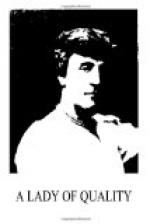“A fine night I have had,” she had grumbled when she brought back Sir Jeoffry’s answer to her lady’s message. “My old bones are like to break, and my back will not straighten itself. I will go to the kitchen to get victuals and somewhat to warm me; your ladyship’s own woman shall sit with you.”
Her ladyship’s “own woman” was also the sole attendant of the two little girls, Barbara and Anne, whose nursery was in another wing of the house, and my lady knew full well she would not come if she were told, and that there would be no message sent to her.
She knew, too, that the fire was going out, but, though she shivered under the bed-clothes, she was too weak to call the woman back when she saw her depart without putting fresh fuel upon it.
So she lay alone, poor lady, and there was no sound about her, and her thin little mouth began to feebly quiver, and her great eyes, which stared at the hangings, to fill with slow cold tears, for in sooth they were not warm, but seemed to chill her poor cheeks as they rolled slowly down them, leaving a wet streak behind them which she was too far gone in weakness to attempt to lift her hand to wipe away.
“Nine times like this,” she panted faintly, “and ’tis for naught but oaths and hard words that blame me. I was but a child myself and he loved me. When ’twas ‘My Daphne,’ and ‘My beauteous little Daphne,’ he loved me in his own man’s way. But now—” she faintly rolled her head from side to side. “Women are poor things”—a chill salt tear sliding past her lips so that she tasted its bitterness—“only to be kissed for an hour, and then like this—only for this and nothing else. I would that this one had been dead.”
Her breath came slower and more pantingly, and her eyes stared more widely.
“I was but a child,” she whispered—“a child—as—as this will be—if she lives fifteen years.”
Despite her weakness, and it was great and woefully increasing with each panting breath, she slowly laboured to turn herself towards the pillow on which her offspring lay, and, this done, she lay staring at the child and gasping, her thin chest rising and falling convulsively. Ah, how she panted, and how she stared, the glaze of death stealing slowly over her wide-opened eyes; and yet, dimming as they were, they saw in the sleeping infant a strange and troublous thing—though it was but a few hours old ’twas not as red and crumple visaged as new-born infants usually are, its little head was covered with thick black silk, and its small features were of singular definiteness. She dragged herself nearer to gaze.
“She looks not like the others,” she said. “They had no beauty—and are safe. She—she will be like—Jeoffry—and like me.”
The dying fire fell lower with a shuddering sound.
“If she is—beautiful, and has but her father, and no mother!” she whispered, the words dragged forth slowly, “only evil can come to her. From her first hour—she will know naught else, poor heart, poor heart!”




